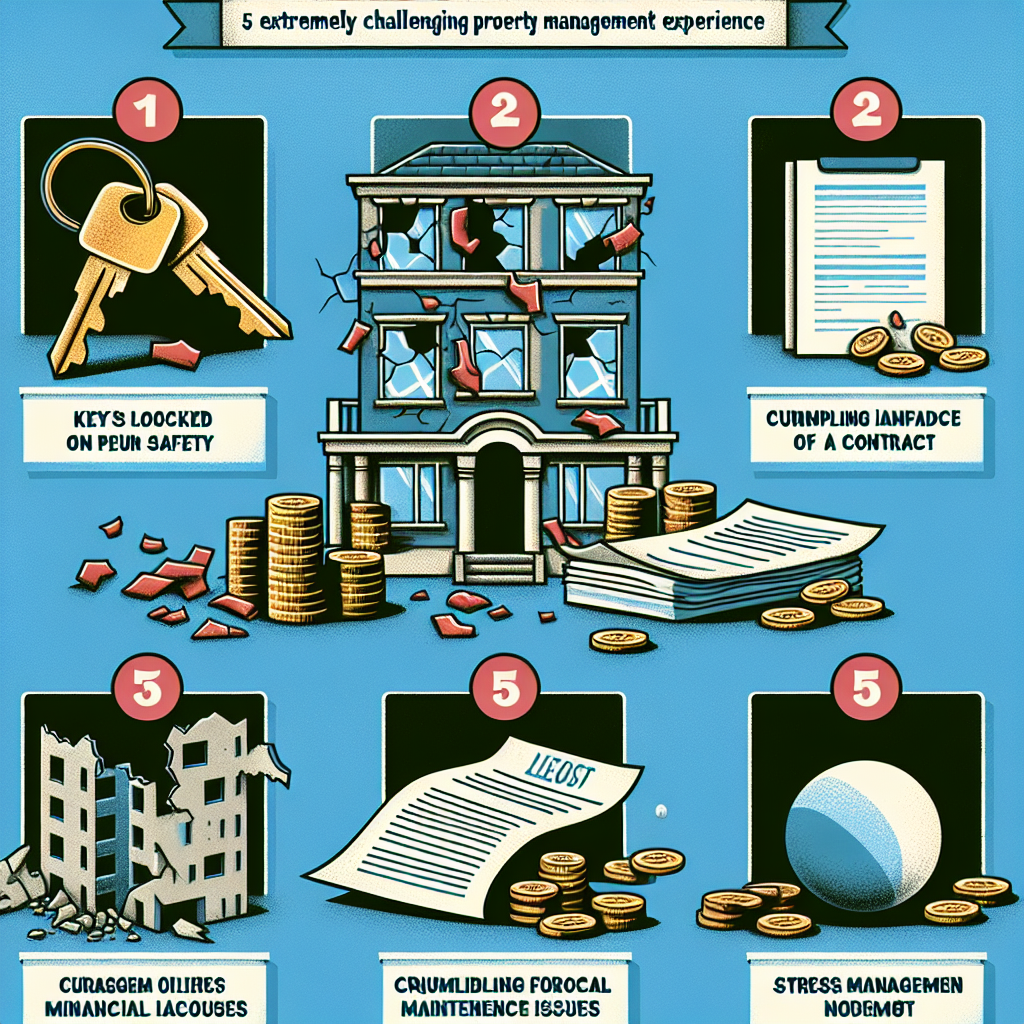-
Table of Contents
- 5 Crucial Takeaways from a Nightmare Property Management Experience
- 1. The Importance of Thorough Tenant Screening
- Case Study: The Unvetted Tenant
- Key Takeaways
- 2. The Necessity of Clear and Enforceable Lease Agreements
- Example: The Ambiguous Lease
- Key Takeaways
- 3. The Value of Regular Property Inspections
- Case Study: The Neglected Property
- Key Takeaways
- 4. The Need for Effective Communication
- Example: The Communication Breakdown
- Key Takeaways
- 5. The Importance of Financial Management
- Case Study: The Financial Mismanagement
- Key Takeaways
- Conclusion
5 Crucial Takeaways from a Nightmare Property Management Experience

Property management can be a lucrative and rewarding venture, but it can also turn into a nightmare if not handled properly. From dealing with difficult tenants to managing unexpected maintenance issues, the challenges can be overwhelming. This article delves into five crucial takeaways from a nightmare property management experience, providing valuable insights and lessons learned to help you navigate the complexities of property management more effectively.
1. The Importance of Thorough Tenant Screening
One of the most critical aspects of property management is tenant screening. A nightmare property management experience often begins with inadequate tenant screening, leading to a host of problems down the line.
Case Study: The Unvetted Tenant
Consider the case of a property manager who rented out an apartment to a tenant without conducting a thorough background check. Within a few months, the tenant stopped paying rent, caused significant damage to the property, and engaged in illegal activities. The eviction process was lengthy and costly, leaving the property manager with substantial financial losses.
Key Takeaways
- Always conduct comprehensive background checks, including credit history, criminal records, and rental history.
- Verify employment and income to ensure the tenant can afford the rent.
- Contact previous landlords for references to gauge the tenant’s reliability and behavior.
2. The Necessity of Clear and Enforceable Lease Agreements
A well-drafted lease agreement is essential for setting expectations and protecting both the landlord and the tenant. A nightmare property management experience can often be traced back to vague or unenforceable lease terms.
Example: The Ambiguous Lease
In one instance, a property manager used a generic lease template that lacked specific clauses regarding maintenance responsibilities and late fees. When the tenant refused to pay for minor repairs and consistently paid rent late, the property manager had no legal recourse to enforce the terms, leading to financial strain and frustration.
Key Takeaways
- Ensure the lease agreement is detailed and includes clauses on rent payment, maintenance responsibilities, and penalties for late payments.
- Consult with a legal professional to draft or review the lease to ensure it complies with local laws and regulations.
- Clearly communicate the terms of the lease to the tenant before they sign.
3. The Value of Regular Property Inspections
Regular property inspections are crucial for maintaining the condition of the property and identifying potential issues before they escalate. Neglecting this aspect can lead to a nightmare property management experience.
Case Study: The Neglected Property
A property manager who failed to conduct regular inspections discovered severe water damage and mold growth only after the tenant moved out. The repairs were extensive and costly, and the property remained vacant for several months, resulting in significant financial losses.
Key Takeaways
- Schedule regular inspections to identify and address maintenance issues promptly.
- Document the condition of the property during each inspection to track changes over time.
- Communicate with tenants about the importance of reporting maintenance issues as soon as they arise.
4. The Need for Effective Communication
Effective communication between the property manager and the tenant is essential for a smooth property management experience. Poor communication can lead to misunderstandings, disputes, and a breakdown in the landlord-tenant relationship.
Example: The Communication Breakdown
In one scenario, a property manager failed to inform the tenant about scheduled maintenance work, leading to inconvenience and frustration for the tenant. The tenant’s dissatisfaction resulted in negative reviews and a strained relationship, making it difficult to address future issues collaboratively.
Key Takeaways
- Establish clear communication channels and protocols with tenants.
- Keep tenants informed about important updates, such as maintenance schedules and policy changes.
- Respond promptly to tenant inquiries and concerns to build trust and maintain a positive relationship.
5. The Importance of Financial Management
Effective financial management is crucial for the success of any property management venture. Poor financial management can quickly turn a profitable property into a financial burden.
Case Study: The Financial Mismanagement
A property manager who failed to keep accurate financial records and budget for unexpected expenses found themselves in a dire financial situation when faced with major repairs. The lack of a financial cushion led to cash flow problems and difficulty maintaining the property.
Key Takeaways
- Maintain accurate financial records, including income, expenses, and receipts.
- Create a budget that accounts for regular expenses and sets aside funds for unexpected repairs and vacancies.
- Regularly review financial statements to identify trends and make informed decisions.
Conclusion
Property management can be a challenging endeavor, but by learning from nightmare experiences, you can avoid common pitfalls and achieve success. The five crucial takeaways from a nightmare property management experience are:
- The importance of thorough tenant screening to avoid problematic tenants.
- The necessity of clear and enforceable lease agreements to set expectations and protect both parties.
- The value of regular property inspections to maintain the property’s condition and address issues promptly.
- The need for effective communication to build trust and prevent misunderstandings.
- The importance of financial management to ensure the property’s profitability and sustainability.
By implementing these lessons, property managers can navigate the complexities of property management more effectively and create a positive experience for both themselves and their tenants.








